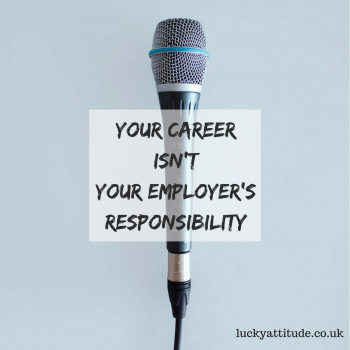Your Professional Development Isn’t Your Employer’s Responsibility

Once upon a time, a college or university diploma meant getting a good and stable job.
But graduating from any institution just isn’t what it used to be.
Many people think that once they have the paper, and they start going to work, they can stop learning.
This attitude diminishes your potential because rapid changes in almost every area of the work are making your current knowledge obsolete.
Technological changes demand continuous connections between education and employment.
There are employers, who invest in vocational training, and if you are an employer who wants to train and develop your staff, check out the Aspiring to Include – they have a dedicated section that includes guidance for employers on matters such as equal pay, diversity, and overall development training.
But, generally, as an individual/employee you shouldn’t rely only on your employer for your professional and individual development.
Continuous learning should expand your horizons beyond your current job at hand and set you up for potential career shifts, which are likely to happen.
Lifelong learning should be your own responsibility.
Below are 6 ways that can keep you learning after college or university:
#1 Improve your articulation skills
I think we can all recognise the value of being well-spoken at work.
The way you speak plays a huge role in your potential to influence your interviewer, boss or colleagues.
People are constantly judging you based on the language you use to express yourself.
Being articulate gives people the impression of a solid, smart, and effective individual.
But if you’re second-guessing yourself or using lots of ‘umms’ and ‘erms’ in your speech, you sound unsure and inarticulate.
People respect and look up to those who speak well.
The good news is that being a good speaker is a SKILL, which means that anyone can learn it.
So how can you learn to be a better speaker?
The secret to being an articulate and engaging speaker is to be more expressive.
So instead of trying to perfectly articulate your thoughts into the “right” words, you should focus your energy on being more expressive.
WHAT you say is a lot less important than HOW you say it.
So aim to have some energy, variety, and firmness to your speech.
If you want to improve your public speaking skills, I’d highly recommend signing up for a public speaking or improv course.
This year I attended Michael Sokolin’s public speaking course which was really really good and reasonably priced. Interested? Read what Michael’s students think of the course on his Facebook page. During the 8-week course, you’ll learn how to be a vulnerable, passionate, authoritative, and spontaneous speaker and with each session you’ll find yourself dropping a mask, becoming less self-conscious and more confident speaker.
#2 Improve your writing skills
Your resume, future work e-mails, client engagements – all involve writing.
The best way to improve your writing is to write regularly.
In my opinion, blogging about something you’re passionate about is the best way to improve your writing.
Bogging forces you to edit and rethink how you phrase your ideas because you know others are reading.
People who write well, read a lot. Reading gives you words and phrases, which improves your vocabulary and writing skills.
#3 Learn a new language
Job applicants with mastery in multiple languages stand out—particularly given that we live in an increasingly connected world.
Speaking more than 1 language is a sought-after skill for many companies.
Thankfully nowadays, acquiring a new language is easy and accessible. For example, the platform Babbel offers a variety of different languages including French, and offers tailored daily lessons.
Unlike free language learning platforms like Duolingo and Live Mocha that are good for casual learners, Babbel is for more serious students, who want to understand grammar, sentence structure, and conversational language in depth.
If you want to learn Spanish, I can highly recommend Anna, spanish tutor who has helped hundreds of people to improve their careers in tourism and international business through her engaging and personable teaching style.
#4 Improve your soft skills: competency isn’t everything
Hard skills are job-specific skills, and soft skills are interpersonal skills. The soft skills include communication, listening, empathy, etc.
Soft skills are important because we need others to succeed.
No matter your job, your success will always depend on how useful you are to other people.
It’s how well you serve others, that help you move forward.
You will always need to interact with people. Hence, refining your interpersonal skills is crucial for your career success.
So, how to communicate effectively?
There are a lot of articles written about soft skills, but the main skill you need to learn is to make people you interact with, feel special by being genuinely interested in them, be upfront about your intentions and try not to be liked but respected.
It’s in our human nature that we want to work with and help those we personally like.
Maybe that’s what they mean when they tell us to work smart, and not hard? 🙂
#5 Complete courses at random
It’s easier than ever to keep taking college-level courses even after you’ve obtained a degree.
Graduates can now do anything from signing up for paid courses from universities online, to accessing free courses via apps and other online programs.
Unless a degree is involved, these won’t necessarily factor into your résumé, but you’ll be able to demonstrate that you’ve maintained a hunger for education and are proactive.
One of the most in-demand skills today is knowing how to code.
To get a head-start in this popular skill, Code Academy is one of those free platforms, where you can learn how to code in languages such as HTML, JavaScript, Ruby, and more.
At Coursera, you’ll be welcomed with hundreds of courses: from big data and data science to medical neuroscience and digital marketing and many many more.
If data is your big passion, head straight to Datacamp. It has a wide range of courses only dedicated to data science and analysis.
Khan Academy is 100% free non-profit educational organisation with a goal of creating an accessible place for people to be educated. The organisation produces short lectures in the form of YouTube videos and is loved by over 3 million people.
Every online business or a passion project involves digital marketing knowledge (that is email, advertising, data, EO, affiliate, social media, and design). You can get a digital marketing degree at ICMP – an award-winning international school in London.
#6 Create a killer CV
A resume is what’s going to get you shortlisted (or not) for the interview. It’s the employer’s first impression of you, so it’s important to get it perfect.
According to Kim Harrison at Cutting Edge PR, potential employers probe through the internet for possible red flags about your career and skills. Three-quarters of recruiters and HR professionals have rejected a candidate based on search engine results. Read more about how to boost your personal reputation online by following Kim’s advice.
I’ve read many CV-writing-tips in my life, and I found that there is one thing that all excellent CVs have in common, no matter the industry – they are concise!
Nobody wants to read long resumes, that have a lot of generic words and repetitive concepts. Try to streamline your CV to make sure that that doesn’t happen to you. A good hybrid resume format is better paired up with a CV. This will help you show your skills in a better light.
Be short and to the point: put your best experience and qualifications at the front of the page, so that your potential employer gets an idea of who you are straight away!
Update your CV as you take on new responsibilities at your current work or gain new skills as you never know where your next opportunity can strike.
Main takeaway
There is no job for life. If you want to stay employable and earn well, you need to stay adaptable and keep learning new things.
Improving your speaking and writing skills is important because it is essential to present your ideas persuasively. Whatever your industry.
Knowing how to create, evaluate and sell ideas is a must in today’s idea-centric economy.
Now, you know what to do about that CV of yours … 😉

